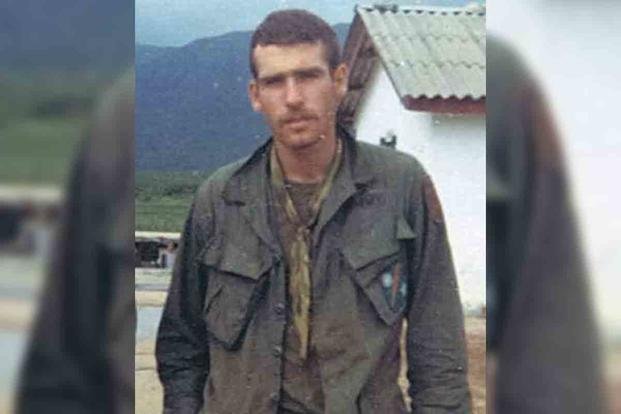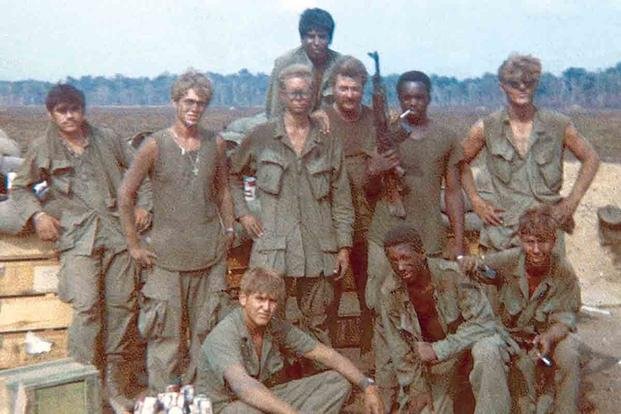Canada is known for some of the world’s greatest exports: crude oil, maple syrup and one-man armies. Thankfully, for all three of those examples, Canada is one of America’s best friends.
Energy and waffles are important, but when it comes to making the world safe for democracy, Canada can hang with the best of us. Three of the top five longest-range sniper kills belong to Canadians. Canadian Leo Major took an occupied town by himself in World War II and later wrecked an entire Chinese battalion in Korea. Then there’s Peter Lemon.
Lemon was a Canadian-American who immigrated to the U.S. at age 2 and joined the U.S. Army as soon as he could, as the war in Vietnam was reaching the height of its unpopularity. He probably could have avoided serving altogether if he wanted to, but he didn’t.
He believed the war was necessary to stem the spread of Communism, and when so many people were fleeing to Canada to evade the draft, Lemon -- the erstwhile Canadian -- enlisted, ready to go to Vietnam in 1969. He learned to shoot at a young age and took the challenge of Army life so well, they made him a squad leader.
When he arrived in Vietnam in July 1969, his world turned upside down. The beliefs that drove him to enlist and fight the good fight quickly fell away as he saw fraggings, the disdain locals had for Americans and allied soldiers killing enemy soldiers who surrendered. It was all very sobering -- so he and his fellow soldiers stopped staying sober all the time.
On April 1, 1970, Lemon was a specialist at Fire Base Illingworth, a 20-year-old sergeant in a support unit at the base in Tay Ninh Province, near South Vietnam’s border with Cambodia. Its mission was to provide artillery support to units operating in that area. It was also bait, a lone firebase in the middle of the jungle, just begging the North Vietnamese to attack it.

When an attack came, the Americans were not as vulnerable as they appeared. They used air superiority to fend off any attack on the base. It was an ongoing trap meant to draw troops away from other areas inside South Vietnam while inflicting heavy casualties on the enemy. But the Communists in Vietnam didn’t kick out the French and fight the Americans to a draw by falling for traps wholesale.
On March 31, 1970, Lemon and his squad went out on a patrol in the local area before coming back to Illingworth that night to get some sleep.
Lemon didn’t sleep for long. The base’s ground surveillance radar picked up a large enemy force headed its way around midnight that night. American troops opened up on the force in the dark, just to tell the North Vietnamese Army it was being watched. Lemon and his men manned their positions, but they didn’t have to do much. That soon changed.
Everyone knew the enemy was out there waiting to strike, but no one knew whether Communists actually would strike. Still, they needed to sleep, so Lemon smoked a joint before bed.
Let’s take a quick aside to note that there’s nothing legal about smoking pot as an American troop. Not in a war zone, not anywhere, especially in 1970. But this was Vietnam and so many soldiers were getting high in the bush, on the firebases and in the cities of South Vietnam, it became as common as drinking Coca-Cola at the USO.
Anyone who wants to judge how some soldiers in the ’70s smoked pot in the war zone should remember that troops today have been known to sneak booze in mouthwash bottles, which seems much worse for some reason.
In any case, Lemon didn’t fall asleep. It was just after 2 a.m. when he started to feel the effects of the drug. That’s also when 400 veteran North Vietnamese soldiers struck the base. The Americans were outnumbered nearly two to one, and their airpower advantage was negated by the dark night. They would have to fight and win or be overrun, no matter how high they were.
Unfortunately for the Communists, Lemon worked better while totally stoned.
“It was the only time I ever went into combat stoned,” he later said. “You get really alert when you are stoned because you have to be.”
As NVA troops poured into the firebase, Lemon hopped onto a .50-cal and poured rounds into the oncoming wave. With mortars and rockets going off around him, he stood tall on his gun. When that stopped working, he used his rifle until it stopped working, too. He picked up hand grenades and started killing Communists until he ran out of grenades.
Lemon ran out of grenades before he ran out of enemy soldiers. There was just one left, so he got to work on the last North Vietnamese troop with his bare hands. That’s when the base exploded.
It seems the base had received tons of artillery shells that couldn’t work with the guns they had. Since they had no use for the ammo, the Americans just stacked it in the center of the firebase. As Lemon was killing an NVA soldier, a communist shell hit the pile and blew a huge hole in Fire Base Illingworth.
When he finally was able to stand, Lemon was wounded, dazed and still stoned but managed to get his battle buddy to an aid station. He didn’t stop fighting, though. He grabbed a bag of grenades and put them to good use.
As he moved, he realized the section of the base was about to be overrun. So he started tossing more grenades. When he ran out of grenades once more, he began to knock out enemy soldiers, one after another, with his fists. Despite being unarmed and wounded three times, he single-handedly kept the base from being overrun by the swarms of NVA.
By the time Lemon finally found another machine gun, the NVA was still on the attack so Lemon took down as many as he could until he passed out from blood loss and awesomeness. There’s only so much of either that any person could handle.
When he woke up in an aid station, he started to refuse treatment or evacuation, believing other men needed assistance more than he did. He might have been right, because it doesn’t appear that Peter Lemon can be killed by mortal men.
Today, he’s one of few Canadian-born Americans to receive the Medal of Honor, which was presented to him by President Richard Nixon. Still not a proponent of the Vietnam War, he did not wear his medal for many years.

One day, it occurred to him that he earned the Medal of Honor fighting for his comrades in arms, and today, he wears it to honor the memory of the men at Fire Base Illingworth who didn’t come home. You can read more about Lemon and his experiences in his book, “Beyond the Medal: A Journey From Their Hearts to Yours.”
-- Blake Stilwell can be reached at blake.stilwell@military.com. He can also be found on Twitter @blakestilwell or on Facebook.
Want to Learn More About Military Life?
Whether you're thinking of joining the military, looking for post-military careers or keeping up with military life and benefits, Military.com has you covered. Subscribe to Military.com to have military news, updates and resources delivered directly to your inbox.

















